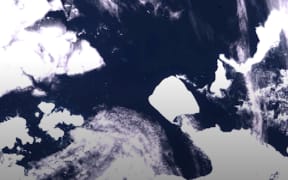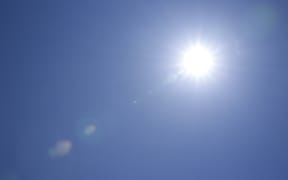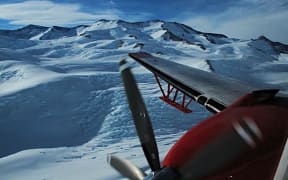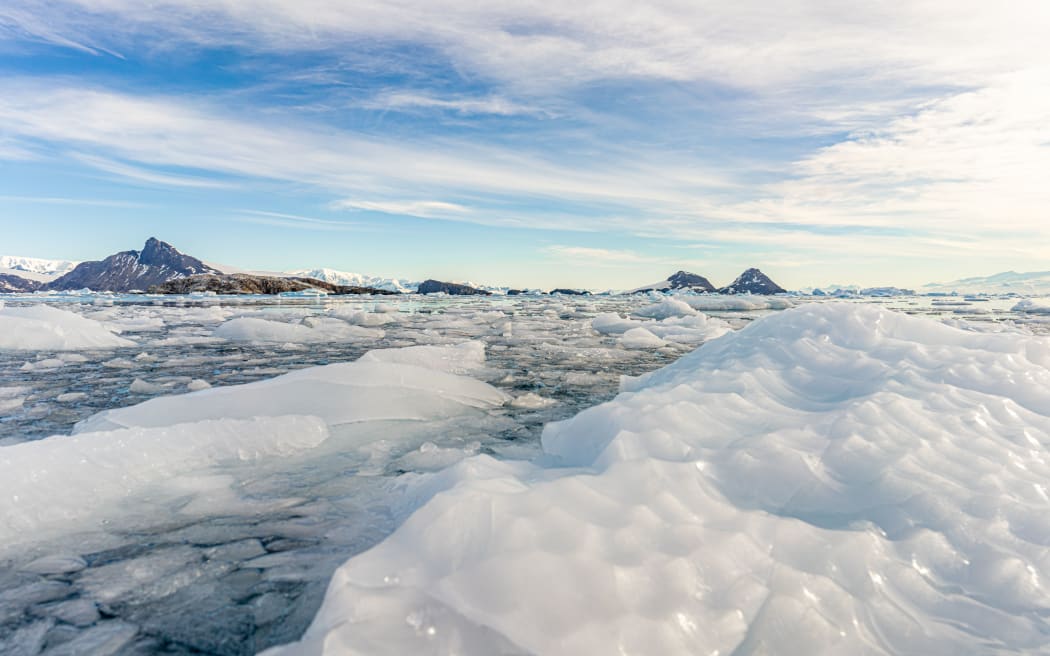
An Antarctic iceberg landscape in Cierva Cove - a deep inlet on the west side of the Antarctic Peninsula, surrounded by rugged mountains and dramatic glacier fronts. Photo: 123RF
Scientists involved in an ambitious attempt to drill deep into the rock and mud below the West Antarctic Ice Sheet say their efforts got "tantalisingly close" and it was disappointing not to reach their goal - but they are determined to return and try to finish the job later this year.
The deep-drilling operation had to be stopped because of issues with the fibreglass piping used to convey the drill through the ground, after a hot water drill had successfully melted through nearly 580m of ice to clear the way, but before they got their prize: A long, tube-shaped core of sediment that could help foretell sea level rise.
Richard Levy of GNS Science, one of the expedition leaders, said the team would be back to repeat the operation with steel tubes later this year, after they realised the fibreglass pipe they were using was too slippery.
The traditional steel pipe was heavier and more prone to freezing, but also more tested in those conditions and likely to succeed, he said.
"With a lot of these remote locations we are really trying to push the boundary to try to get these [climate] archives... but we can go back to a more traditional approach."
Levy said the next attempt was very likely to work, although it could not be guaranteed because even getting the equipment and people to the site and back again safely was an achievement.
"I'm reluctant to say we'll absolutely do it, but we do know the drill can handle it."
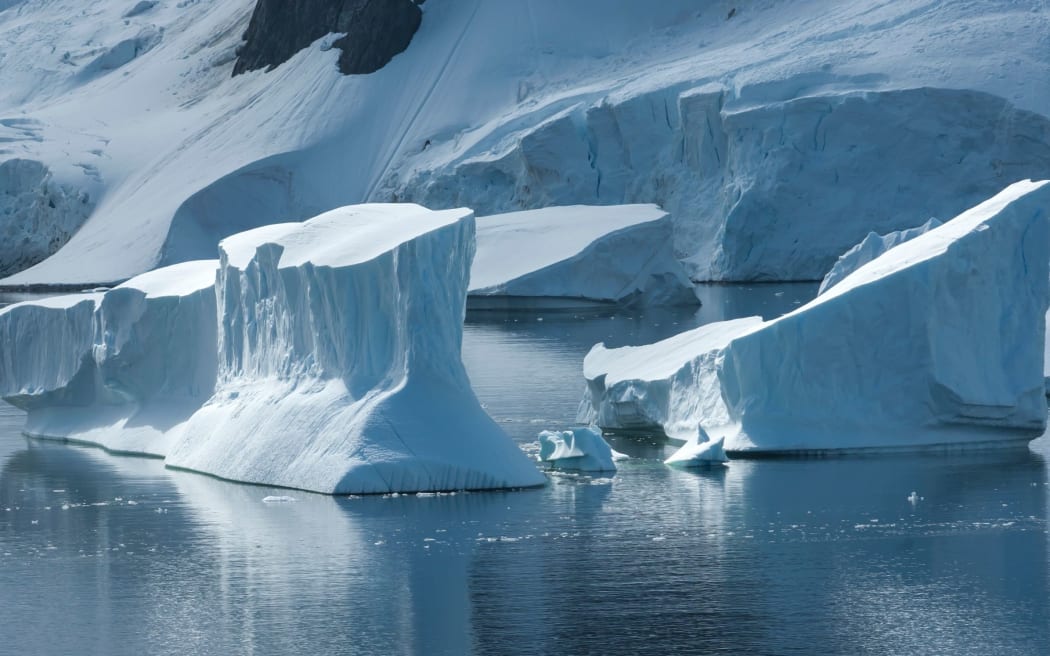
Icebergs in the strait between the islands off the west coast of the Antarctic Peninsula. Photo: 123RF
It was the first time a team had attempted to drill this close to the centre of the ice sheet, while living and camping for months on the ice 860km from Scott Base.
The scientists chose a spot near the junction between the marine ice shelf of the Ross Sea (which sits on top of the ocean) and the land-based ice shelf, a sensitive area where water can enter during times of global heating and nibble away at the shelf and weaken it.
"One of the best ways to work out how those changes might occur is to look back in time," Levy said.
The goal is to retrieve a tubular core of sediment from under the thick ice shelf, so researchers can look at layers of rock formed more than 100,000 years ago when Earth was around the same average temperature it is approaching today.
That previous period of heating was caused by natural causes rather than people burning fossil fuels, but it can reveal clues about how the ice might behave.
Clues in the rocks should help show how the ice sheet responded to heating air and sea water, and how quickly it might disintegrate with human-caused climate change.
Levy said if they found evidence of open ocean-dwelling plankton species and marine algae in the rock layers, this would show this vulnerable ice must have melted during the last period of global heating, while absence of these species would show the ice had more resilience.
"If we can find those sorts of [open water] organisms in layers of rock that date back to when we know temperatures were about 1.5C above preindustrial [levels], that provides the evidence that the ice shelf was gone."
In that case, he said, "Then there's almost nothing we can do, given we're about to experience those sort of temperatures".
That would mean coastal communities needed to prepare. On the other hand: "If we find evidence the ice shelf… stuck around, we know there is some resilience in the ice shelf to the sort of temperatures we're about to experience".
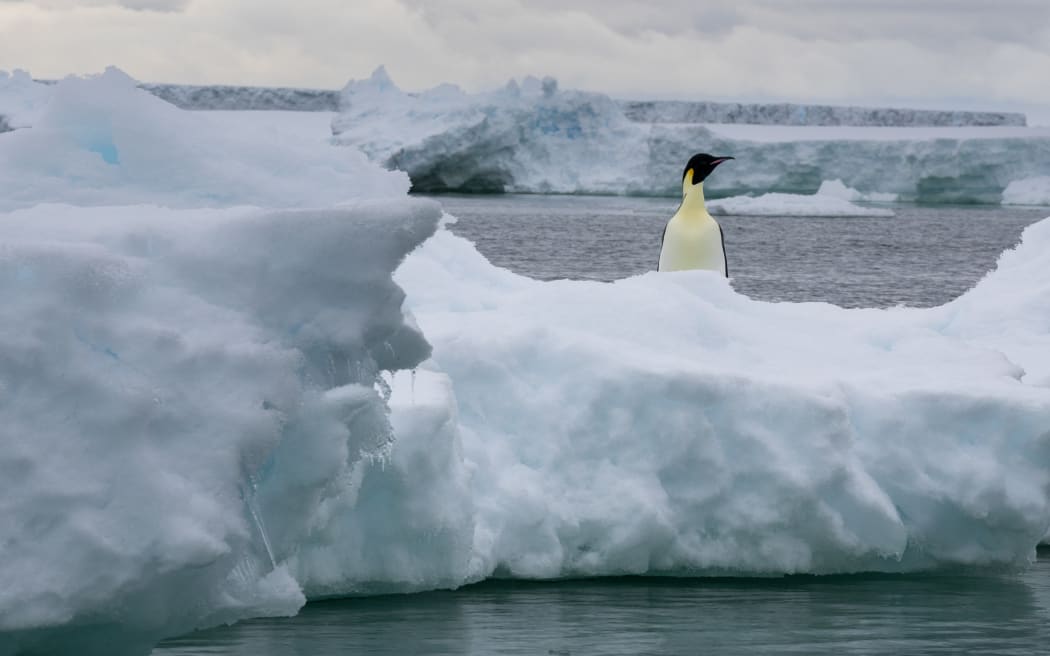
The project's researchers say the West Antarctic Ice Sheet is losing ice mass at an "unprecedented rate". Photo: Sergio Pitamitz / Biosphoto via AFP
The West Antarctic Ice Sheet - a massive ice store that, if melted, would raise sea levels by several metres - is currently losing mass at what the project's researchers said was an "unprecedented rate".
The sediment the drill team was trying to reach is 200m below the ocean floor and could reach back millions of years in time.
The team returned with some shallower sediment samples using a hammer-and-rope technique to drive a steel tube into the sea floor.
Levy said they badly wanted to help people understand the risks of sea level rise from the ice sheet, and were mindful of the consequences of a year's delay. But he was relieved the project could continue and, likely, succeed.
Incredibly, the drillers found signs of life under the thick ice, far from the open ocean. A fishy-like creature was spotted moving around, but could not be positively identified. It was not the first time organisms have been spotted down there, but it was impressive to see signs of life, Levy said.
"This fishy-looking thing was a bit of a surprise, it's quite amazing when you think you're 400m, maybe 500m from the edge of the Ross Ice Shelf, so you're in a very dark, thin cavity... but life has managed to etch out a way to exist."
Levy said this was his 14th season on the ice, and was meant to be his last.
"I had told my wife before I left home this was my last season."
Those plans were scuppered when the drilling mission had to stop.
"I came into the drill tent and nothing was happening and that's not often a good sign. I realised pretty quickly there was an issue. My initial feeling was disappointment and frustration, but also relief that we have a way forward."
Levy said his wife and whānau were understanding that he needed to go back, "at least outwardly".
![[Weddell Sea, Snow Hill Island, Antarctica] A nursery group of Emperor penguin chicks, huddled together, looking around. A breeding colony. (Photo by David Schultz / Mint Images / Mint Images via AFP)](https://media.rnztools.nz/rnz/image/upload/s--U_2rbntT--/ar_16:10,c_fill,f_auto,g_auto,q_auto,w_288/v1692902178/4L3QHNK_074_8072_jpg)
